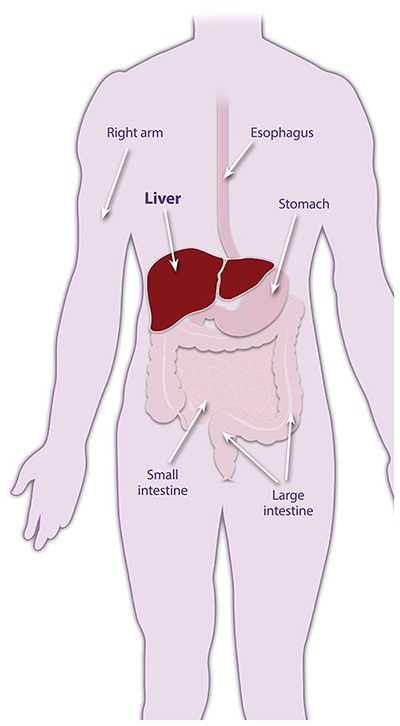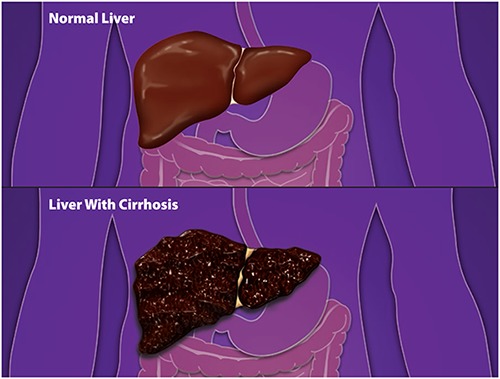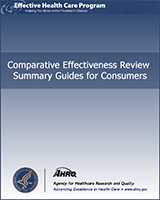NCBI Bookshelf. A service of the National Library of Medicine, National Institutes of Health.
Comparative Effectiveness Review Summary Guides for Consumers [Internet]. Rockville (MD): Agency for Healthcare Research and Quality (US); 2005-.
This publication is provided for historical reference only and the information may be out of date.
Is This Information Right for Me?
This information is for you if you meet any of the following
- You were born in the years between 1945 and 1965. People born during this time are more likely to be diagnosed with hepatitis C.
- You have an increased risk for hepatitis C. Risk factors include having injected drugs (shared drug needles), having received a blood transfusion before 1992, and the other factors listed on page 3.
- You are age 18 or older and want to know more about testing for the hepatitis C virus. This information is from research on adults.
What will this summary cover?
This summary will cover:
- What hepatitis C is and how it can be harmful
- Who is at risk for hepatitis C
- What hepatitis C testing is
- Who should be tested for hepatitis C
Note: This summary does not talk about specific treatments for chronic hepatitis C. For more information on treatments, see the summary Treating Chronic Hepatitis C, A Review of the Research for Adults available at www.effectivehealthcare.ahrq.gov/hep-c-treatment.cfm.
This summary can help you talk with your doctor about whether you should be tested for hepatitis C.
Where does the information come from?
Researchers funded by the Agency for Healthcare Research and Quality (AHRQ), a Federal Government research agency, reviewed 162 studies on testing for the hepatitis C virus published between January 1947 and May 2012. The report was reviewed by clinicians, researchers, experts, and the public. You can read the report at www.effectivehealthcare.ahrq.gov/hepatitis-c-screening.cfm.
Note: People who have had a liver transplant, people with HIV infection, people receiving dialysis for kidney failure, and children were not included in the research for this summary.
Understanding the Condition
What is hepatitis C?
Hepatitis C is a disease caused by a virus that infects your liver. Your liver is an important organ in your body and has many functions. The liver removes harmful chemicals from your body, aids digestion, and processes vitamins and nutrients from food. The liver also makes chemicals that help your blood clot when you have a cut. You cannot live without a liver.
For some people with hepatitis C, the infection lasts only a short time, and their body is able to clear the virus. But, most people infected with hepatitis C develop chronic hepatitis C.
Chronic hepatitis C is a long-term illness that happens when the hepatitis C virus stays in your body. Most people who have chronic hepatitis C do not have symptoms for many years until the infection has started to damage their liver.

How can hepatitis C be harmful?
If hepatitis C is left untreated, over time (up to 20 years or longer in some people), the infection can damage the liver and make it not work properly. It can cause cirrhosis (scarring of the liver that makes the liver not work correctly and causes other problems), liver cancer, liver failure, and death.
- Hepatitis C is a leading cause of liver cancer.
- Hepatitis C is the most common reason for liver transplants in the United States.
- Out of 100 people with chronic hepatitis C who do not receive treatment, up to 20 people will develop cirrhosis within 20 years of being infected. After 20 years, the number of people with chronic hepatitis C who develop cirrhosis can be much higher. Cirrhosis increases the chance of liver cancer and death.
- Hepatitis C causes about 15,000 deaths in the United States each year.

Who is at risk for hepatitis C?
The hepatitis C virus is spread through infected blood or other bodily fluids. There is no vaccine for hepatitis C.
People at risk for hepatitis C include people who:
- Received a blood product, such as clotting factors for blood clotting problems, before 1987*
- Had a blood transfusion or an organ transplant before 1992**
- Got a tattoo with unsterilized tools
- Injected drugs (took drugs through a needle) or snorted drugs (inhaled drugs through a tube or straw), even if it was only one time
- Were exposed to the hepatitis C virus at work, such as a health care worker coming in contact with infected blood
- Spent many years on dialysis for kidney failure
- Were born to a mother with hepatitis C
- Have been in jail
You cannot catch the hepatitis C virus from simply being around infected people, shaking hands, or hugging.
A mother with hepatitis C can pass the virus to her child during birth. Researchers found that the risk is about the same for both cesarean section (C-section) and vaginal delivery. Researchers also found that breastfeeding is not associated with an increased risk of passing the hepatitis C virus from mother to child.
How common is hepatitis C?
- About 4 million people in the United States have chronic hepatitis C.
- Around three out of every four Americans infected with the hepatitis C virus were born in the years between 1945 and 1965 (Baby Boomers).
- About 8 out of every 10 people infected with the hepatitis C virus develop chronic hepatitis C.
What are the symptoms of hepatitis C?
Most people do not notice any symptoms of hepatitis C for many years until the virus begins to damage their liver. Other people have symptoms right away.
When symptoms of hepatitis C do appear, they can include those listed below. However, some of these symptoms can be caused by common illnesses as well.
- Fever
- Upset stomach and nausea
- Diarrhea
- Loss of appetite
- Feeling exhausted
- Yellowed eyes and skin, called “jaundice” (pronounced JAWN-dis)
- Swelling of the belly
- Easy bruising
- Taking longer for bleeding to stop
Understanding Hepatitis C Testing
How do I know if I have the hepatitis C virus?
A simple blood test can show if you have been infected with the hepatitis C virus in the past. If the blood test comes back positive, your doctor will do a second blood test to see if the virus is still in your blood. These blood tests are very accurate.
Why is testing for hepatitis C important?
Many people who are infected with the hepatitis C virus do not know they have it. Symptoms usually do not show up until the infection begins to damage the liver. For some people, this can happen up to 20 years or longer after being infected.
Testing for the hepatitis C virus can help identify infected people early so they can get treatment before their liver becomes damaged. Infected people can also make lifestyle changes to help protect their liver, such as avoiding alcohol. Testing can also help identify infected people so they can take steps to prevent spreading the virus to others. Hepatitis C is spread through blood. An infected person can prevent infecting others by not sharing any items that come into contact with his or her blood.
Who should be tested for hepatitis C?
The Centers for Disease Control and Prevention (CDC)* and a national group** of doctors, nurses, and others who are experts in prevention reviewed research on testing for hepatitis C and recommend the following:
- Doctors should offer one-time hepatitis C testing to adults born in the years from 1945 through 1965.
- Adults at an increased risk for hepatitis C should be tested.
- Risk factors include having injected drugs (shared drug needles), having received a blood transfusion before 1992, and the other factors listed on page 3.
- People who continue to be at risk (such as those who continue to inject drugs) may need to be tested for hepatitis C more than once.
If you feel you should be tested for hepatitis C, talk with your doctor.
What if I find out that I have hepatitis C?
Hepatitis C can be cured, although not everyone who has hepatitis C needs to be treated right away. Your doctor will talk with you about if and when you may need treatment. You can also make lifestyle changes to help protect your liver, such as avoiding alcohol.
Treatments are available that can help your body clear the virus for good. Before deciding on treatment, your doctor may do blood tests to check your liver for signs of damage. Some doctors may also suggest a liver biopsy. During a liver biopsy, the doctor removes a tiny piece of your liver to look for damage. The results of the biopsy can help the doctor decide if you need treatment right away or if you can wait to be treated. Some people wait years before starting treatment.
Hepatitis C treatments consist of medicines (a weekly shot along with pills taken by mouth) that you take for 6 months to a year. Out of every 10 people who complete treatment, up to 7 are able to clear the hepatitis C virus from their body. The success rate depends on several things, including the specific type of hepatitis C virus a person has, the type of treatment used, and how long the treatment lasted.
The medicines to treat hepatitis C can cause many side effects, including flu-like symptoms, anemia (a low number of red blood cells), a rash, and depression. The side effects can sometimes be severe.
New medicines to treat hepatitis C are currently being developed. These new medicines that are taken by mouth are thought to work better and have fewer side effects than the medicines available right now. Some of these new medicines may be approved by the U.S. Food and Drug Administration (FDA) in the next few years.
For more information on treatments for chronic hepatitis C, see the research summary Treating Chronic Hepatitis C, A Review of the Research for Adults available at www.effectivehealthcare.ahrq.gov/hep-c-treatment.cfm. To order free print copies, call the AHRQ Publications Clearinghouse at 800-358-9295.
What is the cost of testing for hepatitis C?
The cost to you for a hepatitis C blood test depends on your health insurance. Some facilities offer free or low-cost hepatitis C testing.
Making a Decision
What should I think about?
In deciding whether you should be tested for hepatitis C, you may want to think about:
- Whether you were born between 1945 and 1965
- Whether you have any of the risk factors for hepatitis C
- Whether you continue to be at risk for becoming infected with hepatitis C
- The benefits of getting tested for hepatitis C
- What a positive test result would mean
Ask your doctor
- Where can I get tested for hepatitis C?
- How much will the test cost?
- How long will it take to get the results of the test?
- If my test is negative, will I need to be tested again?
- What will we do if I have a hepatitis C infection?
Sources
The information in this summary comes from the report Screening for Hepatitis C Virus Infection in Adults. The report was produced by the Oregon Evidence-based Practice Center through funding by the Agency for Healthcare Research and Quality (AHRQ).
For a copy of the report or for more information about AHRQ and the Effective Health Care Program, go to www.effectivehealthcare.ahrq.gov/hepatitis-c-screening.cfm.
Additional information came from the MedlinePlus® Web site, a service of the National Library of Medicine and the National Institutes of Health. This site is available at www.nlm.nih.gov/medlineplus.
This summary was prepared by the John M. Eisenberg Center for Clinical Decisions and Communications Science at Baylor College of Medicine, Houston, TX. Adults born in the years between 1945 and 1965 reviewed this summary.
Footnotes
- *
Improved testing of blood products from donors began in 1987.
- **
Reliable testing for hepatitis C in donated blood began in 1992.
- *
For more information on the CDC’s recommendations for hepatitis C testing, go to www
.cdc.gov/hepatitis/hcv/guidelinesc .htm. - **
This independent group is the U.S. Preventive Services Task Force. For more information on the Task Force and its recommendations for hepatitis C testing, go to www
.uspreventiveservicestaskforce .org/uspstf12 /hepc/hepcfinalrs.pdf.
- Progress and challenges of a pioneering hepatitis C elimination program in the country of Georgia.[J Hepatol. 2020]Progress and challenges of a pioneering hepatitis C elimination program in the country of Georgia.Averhoff F, Shadaker S, Gamkrelidze A, Kuchuloria T, Gvinjilia L, Getia V, Sergeenko D, Butsashvili M, Tsertsvadze T, Sharvadze L, et al. J Hepatol. 2020 Apr; 72(4):680-687. Epub 2019 Dec 4.
- Use of nucleic acid testing for blood donor screening of human immunodeficiency virus and hepatitis C virus in the Saudi population.[Saudi Med J. 2001]Use of nucleic acid testing for blood donor screening of human immunodeficiency virus and hepatitis C virus in the Saudi population.Akhter J, Roberts GT, Perry A, Gaucher JS, Howman PA. Saudi Med J. 2001 Dec; 22(12):1073-5.
- A crowdsourced intervention to promote hepatitis B and C testing among men who have sex with men in China: study protocol for a nationwide online randomized controlled trial.[BMC Infect Dis. 2018]A crowdsourced intervention to promote hepatitis B and C testing among men who have sex with men in China: study protocol for a nationwide online randomized controlled trial.Fitzpatrick T, Zhou K, Cheng Y, Chan PL, Cui F, Tang W, Mollan KR, Guo W, Tucker JD. BMC Infect Dis. 2018 Sep 29; 18(1):489. Epub 2018 Sep 29.
- Review The high-risk donor: viral infections in solid organ transplantation.[Curr Opin Organ Transplant. 2008]Review The high-risk donor: viral infections in solid organ transplantation.Singer AL, Kucirka LM, Namuyinga R, Hanrahan C, Subramanian AK, Segev DL. Curr Opin Organ Transplant. 2008 Aug; 13(4):400-4.
- Review Treating Chronic Hepatitis C: A Review of the Research for Adults.[Comparative Effectiveness Revi...]Review Treating Chronic Hepatitis C: A Review of the Research for Adults.John M. Eisenberg Center for Clinical Decisions and Communications Science. Comparative Effectiveness Review Summary Guides for Consumers. 2005
- Testing for the Hepatitis C Virus - Comparative Effectiveness Review Summary Gui...Testing for the Hepatitis C Virus - Comparative Effectiveness Review Summary Guides for Consumers
Your browsing activity is empty.
Activity recording is turned off.
See more...
